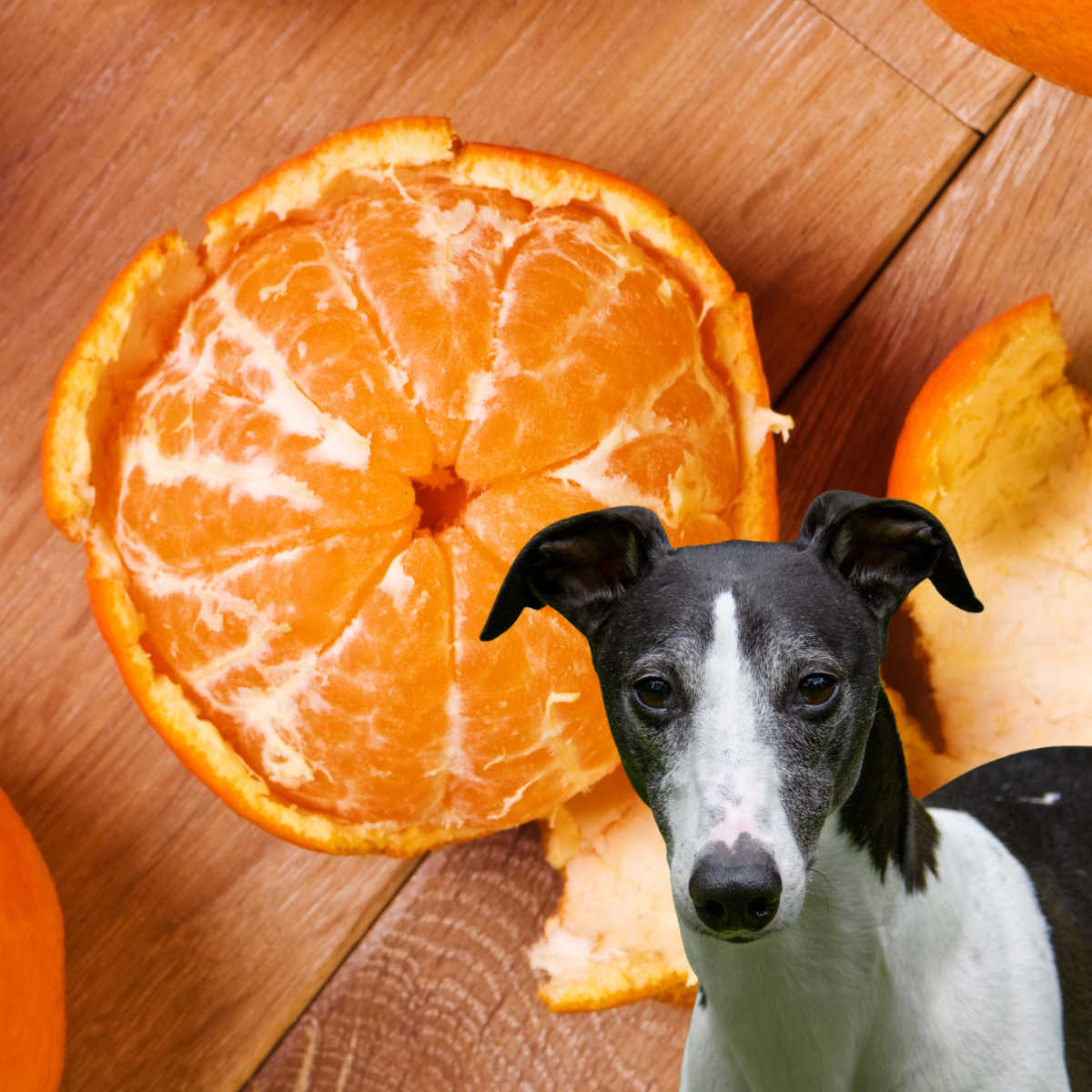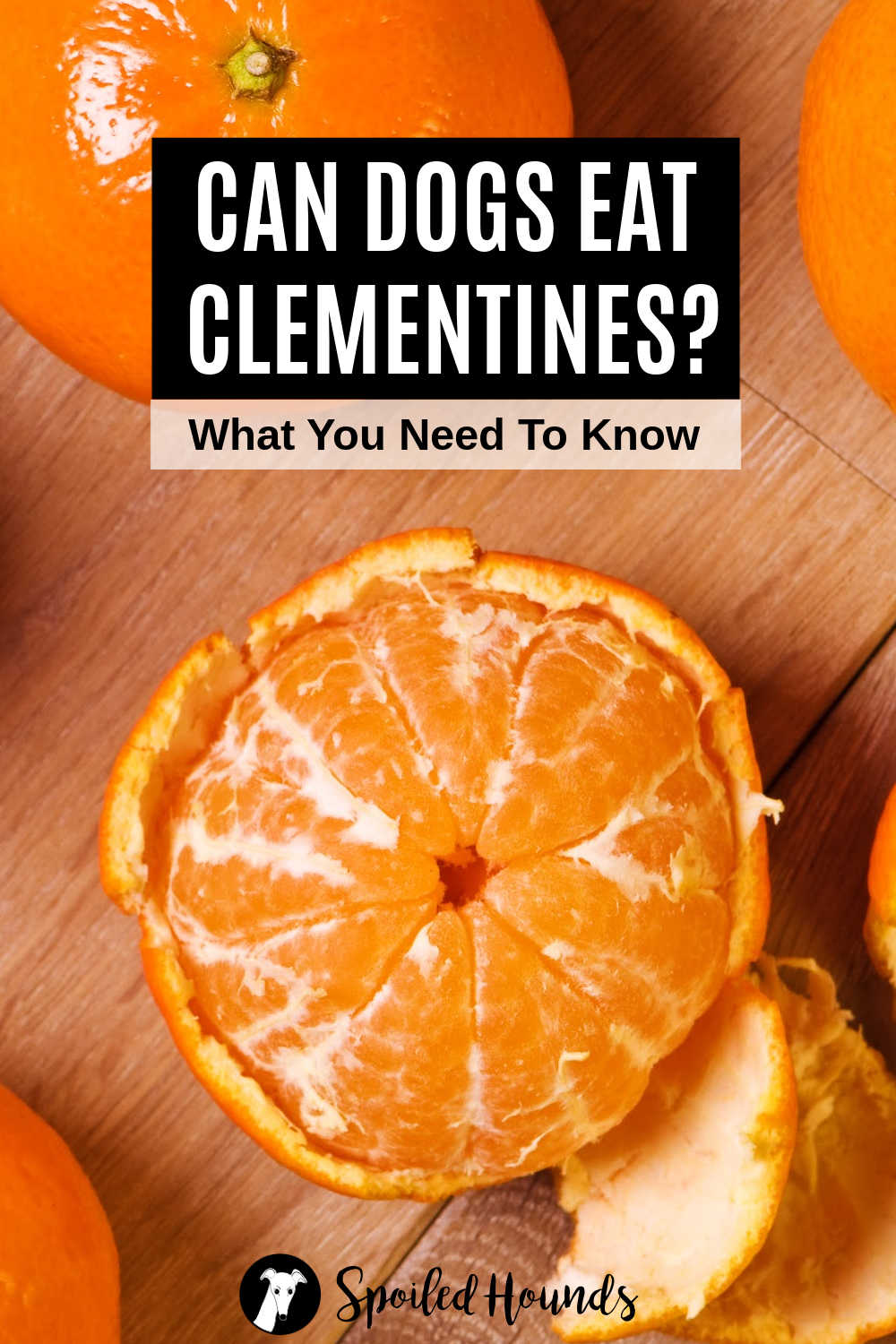They are easy to peel and fun to eat, but can dogs eat clementines? Read this guide before sharing them with your furry friend.
It is tempting to want to share healthy citrus fruits with your canine friend, but you should be careful with how much you let them eat. Read this guide to learn more about whether it is a good idea to let them eat clementines.

For ultimate pet safety, please ask your vet any questions you have regarding your dog eating clementines.
- Can Dogs Eat Clementines
- Different Types Of Oranges
- Are Clementines Good For Dogs
- Are Clementines Bad For Dogs
- Can Puppies Eat Clementines
- Parts of Clementines and Dogs
- Can Dogs Eat Orange Seeds
- Can Dogs Eat Cuties
- Can Dogs Eat Halos
- Can Dogs Eat Mandarins
- Can Dogs Eat Satsumas
- Can Dogs Eat Tangerines
- Final Thoughts
- More Dog Food Resources
Can Dogs Eat Clementines
Yes, it is safe to give your dog oranges of any kind, including clementines. The biggest danger of Halos, clementines or any other type of oranges is that the seeds could be a choking hazard for smaller breeds.
Just regular oranges, clementines are safe fruits to share with dogs in small quantities.
Dogs should not eat a lot of sugar, even from natural sources like oranges.
In this guide, we will look at all the different types of oranges and how safe they are for your dog along with any warnings you need to know about.

Different Types Of Oranges
There are different varieties of this tasty treat that you might find in the grocery store. All of the varieties of this sweet snack are safe for dogs to eat.
Cuties vs Clementines
Cuties are a brand name that sells clementine oranges. It’s like saying Kleenex instead of tissues. So, whenever you read that dogs can eat clementines, this also means they can safely eat Cuties.
Cuties vs Halos
Cuties and Halos are both different companies that sell the same type of fruit, clementine oranges.
Halos vs Clementines
Halos are the name of the brand that packages and sells clementine oranges.
Mandarin Oranges vs Clementines
Clementines are a specific type of mandarin oranges. Clementines are a sweeter and seedless variety of mandarin oranges. Cuties, Sweeties, and Halos are all mandarin oranges.
Tangerines vs Clementines
Tangerines and clementines are different types of mandarin oranges. Tangerines are not as sweet as clementines, and they have rougher skin that isn’t as easy to peel.
Are Clementines Good For Dogs
Yes, a small amount of clementines are good for dogs. Remember, anytime you introduce new food to your dog, do it slowly and watch for signs of allergic reactions or any negative reactions to the fruit.
Health Benefits of Clementines
Just like the other types of oranges, clementines have citric acid, which is a great source of vitamin C, which is amazing for your dog’s immune system. Dogs with liver disease might benefit from the vitamin C in clementines.
They also have antioxidants in them that fight disease-causing free radicals.
The dietary fiber in oranges is amazing for your pet’s digestive health.
Are Clementines Bad For Dogs
Be careful with how many clementines you let your dog eat. Large amounts of fruit – even safe fruit – could give your pet an upset stomach.
Since these oranges are high in natural sugars, you shouldn’t let your diabetic dog eat the fruit or drink orange juice.
Mandarin orange peels are a choking hazard for small dogs as well. It’s best not to let your dog eat the whole fruit; just give them small bites of peeled clementines.
Can Puppies Eat Clementines
Due to the high sugar content and high amount of fiber, puppies should not eat clementines. It might give them digestive problems since they have sensitive stomachs.

Parts of Clementines and Dogs
Now let’s look at the different parts of clementines and how safe or dangerous they are for dogs to eat.
- Clementine Peels – Too much fiber for dogs; do not let them eat the peels.
- Clementine Buds – Safe for dogs to eat, but could give them GI issues.
- Clementine Berries – Safe for pups but could upset their stomach
- Clementine Extract – Very powerful, could lead to gastrointestinal issues, do not let your dog eat this plain.
- Clementine Essential Oil – Very strong oil; only diffuse mild versions around your dog and use a carrier oil if you apply it topically.
- Clementine Juice – Contains lots of sugar and calories; best not to give it to your dog.
- Clementine Without Skin – Safe for dogs in small amounts.
- Clementine Without Seeds – Safe for dogs in small amounts.
Can Dogs Eat Orange Seeds
Orange seeds are a choking hazard for small dogs. Always remove the seeds before you allow your dog to eat any type of orange.
Can Dogs Eat Cuties
Cuties are safe for dogs to eat. If you give your pet a few orange slices, it could boost their immune system. Always watch for an adverse reaction, like GI upset, the first time you share Cuties with your pet.
Can Dogs Eat Halos
Yes, dogs can eat small amounts of Halos. If they eat too much, they might get an upset stomach.
Are Halos Clementines?
Yes, Halos are a brand name for clementine oranges.
Can Dogs Eat Mandarins
Yes, mandarin oranges are safe for dogs to eat. If they eat too many, it might give your pup a stomach upset or give them a spike in blood sugar.
Can Dogs Eat Satsumas
Satsumas are known as the juiciest variety of mandarin oranges. Dogs can safely eat the, but too many might give them gastrointestinal upset.
Can Dogs Eat Tangerines
Yes, dogs can eat tangerines. It’s a good idea to limit how many they eat because you can prevent a lot of GI issues in dogs by giving them only a small amount on rare occasions.
Final Thoughts
As you can see, a whole orange probably isn’t a good treat for dogs. You should peel them and remove any seeds. Even though clementines are safe for dogs, they are high in sugar and fiber, so too many of them could give your dog diarrhea or a hurt belly.
More Dog Food Resources
What other human foods are safe for dogs? Here is more information about different types of fruit dogs can eat and ones they should not eat.
- Can Dogs Eat Durian
- Can Dogs Eat Figs
- Can Dogs Eat Honeydew
- Can Dogs Eat Limes
- Can Dogs Eat Nectarines
- Can Dogs Eat Pears
Find lots of information about human food dogs can eat (and ones they can’t) here on Spoiled Hounds!
📌 Pin this to save and share 📌


Citrus fruits like tangerines and clementines should only be eaten occasionally by dogs. Both types of fruit are neither healthy nor unhealthy. The sweet fruits mainly contain sugar, which dogs can do without.